Technology, Automation, and Unemployment: An Annotated Bibliography
VerifiedAdded on 2023/06/05
|6
|1054
|191
Annotated Bibliography
AI Summary
This annotated bibliography examines the complex relationship between technological advancements and unemployment rates. It delves into various sources that argue against the direct correlation between the two, highlighting that the fear of technology-driven job losses is often based on superficial data. The bibliography includes peer-reviewed articles and reports from organizations like the UN, which suggest that technology, including AI and automation, often creates more job opportunities than it eliminates by opening up new specialized roles and enhancing overall productivity. The analysis concludes that concerns about mass unemployment due to technology are largely unfounded and that technological progress has a net positive effect on employment.
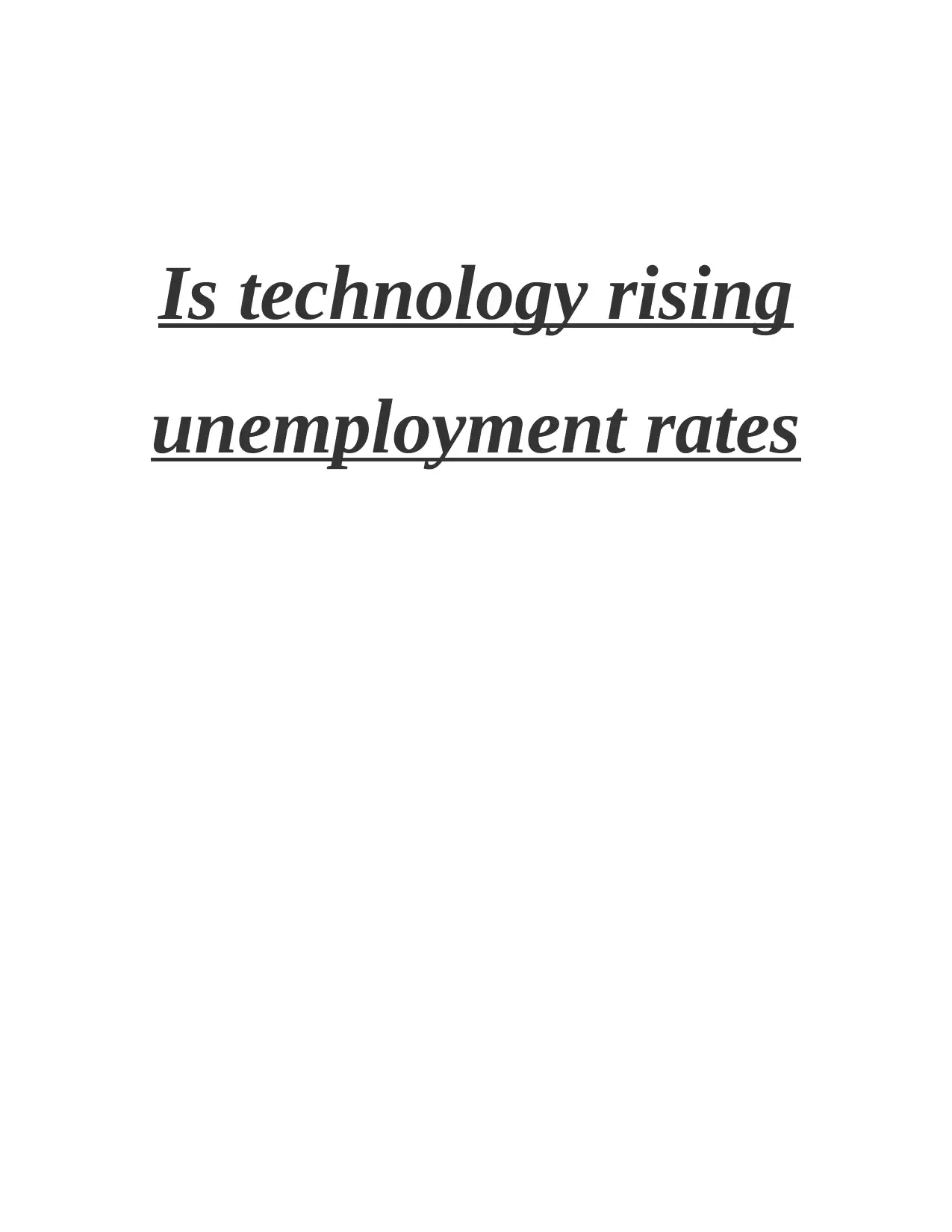
Is technology rising
unemployment rates
unemployment rates
Paraphrase This Document
Need a fresh take? Get an instant paraphrase of this document with our AI Paraphraser

Contents
INTRODUCTION...........................................................................................................................1
MAIN BODY..................................................................................................................................1
Annotated Bibliography...............................................................................................................1
CONCLUSION................................................................................................................................3
REFERENCES................................................................................................................................4
INTRODUCTION...........................................................................................................................1
MAIN BODY..................................................................................................................................1
Annotated Bibliography...............................................................................................................1
CONCLUSION................................................................................................................................3
REFERENCES................................................................................................................................4
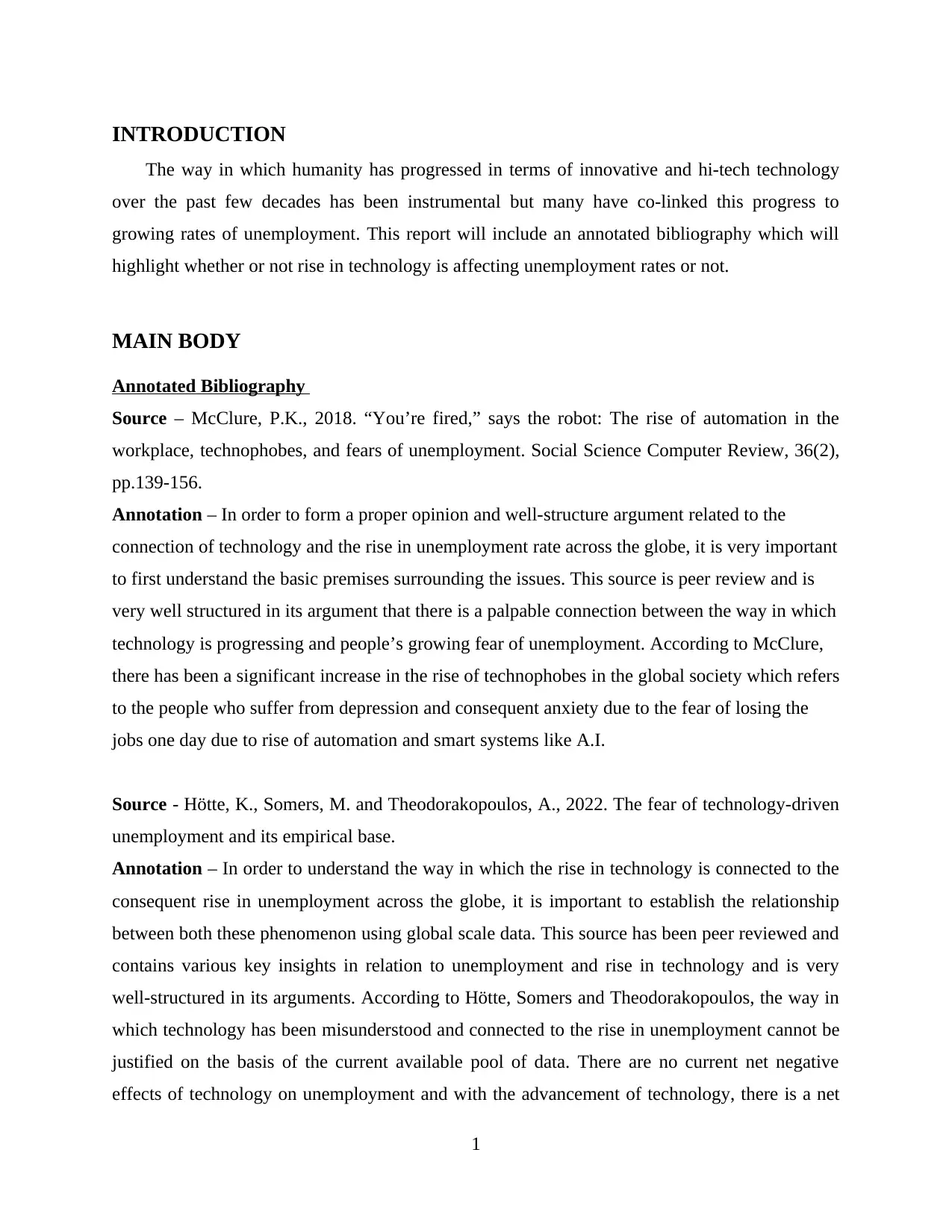
INTRODUCTION
The way in which humanity has progressed in terms of innovative and hi-tech technology
over the past few decades has been instrumental but many have co-linked this progress to
growing rates of unemployment. This report will include an annotated bibliography which will
highlight whether or not rise in technology is affecting unemployment rates or not.
MAIN BODY
Annotated Bibliography
Source – McClure, P.K., 2018. “You’re fired,” says the robot: The rise of automation in the
workplace, technophobes, and fears of unemployment. Social Science Computer Review, 36(2),
pp.139-156.
Annotation – In order to form a proper opinion and well-structure argument related to the
connection of technology and the rise in unemployment rate across the globe, it is very important
to first understand the basic premises surrounding the issues. This source is peer review and is
very well structured in its argument that there is a palpable connection between the way in which
technology is progressing and people’s growing fear of unemployment. According to McClure,
there has been a significant increase in the rise of technophobes in the global society which refers
to the people who suffer from depression and consequent anxiety due to the fear of losing the
jobs one day due to rise of automation and smart systems like A.I.
Source - Hötte, K., Somers, M. and Theodorakopoulos, A., 2022. The fear of technology-driven
unemployment and its empirical base.
Annotation – In order to understand the way in which the rise in technology is connected to the
consequent rise in unemployment across the globe, it is important to establish the relationship
between both these phenomenon using global scale data. This source has been peer reviewed and
contains various key insights in relation to unemployment and rise in technology and is very
well-structured in its arguments. According to Hötte, Somers and Theodorakopoulos, the way in
which technology has been misunderstood and connected to the rise in unemployment cannot be
justified on the basis of the current available pool of data. There are no current net negative
effects of technology on unemployment and with the advancement of technology, there is a net
1
The way in which humanity has progressed in terms of innovative and hi-tech technology
over the past few decades has been instrumental but many have co-linked this progress to
growing rates of unemployment. This report will include an annotated bibliography which will
highlight whether or not rise in technology is affecting unemployment rates or not.
MAIN BODY
Annotated Bibliography
Source – McClure, P.K., 2018. “You’re fired,” says the robot: The rise of automation in the
workplace, technophobes, and fears of unemployment. Social Science Computer Review, 36(2),
pp.139-156.
Annotation – In order to form a proper opinion and well-structure argument related to the
connection of technology and the rise in unemployment rate across the globe, it is very important
to first understand the basic premises surrounding the issues. This source is peer review and is
very well structured in its argument that there is a palpable connection between the way in which
technology is progressing and people’s growing fear of unemployment. According to McClure,
there has been a significant increase in the rise of technophobes in the global society which refers
to the people who suffer from depression and consequent anxiety due to the fear of losing the
jobs one day due to rise of automation and smart systems like A.I.
Source - Hötte, K., Somers, M. and Theodorakopoulos, A., 2022. The fear of technology-driven
unemployment and its empirical base.
Annotation – In order to understand the way in which the rise in technology is connected to the
consequent rise in unemployment across the globe, it is important to establish the relationship
between both these phenomenon using global scale data. This source has been peer reviewed and
contains various key insights in relation to unemployment and rise in technology and is very
well-structured in its arguments. According to Hötte, Somers and Theodorakopoulos, the way in
which technology has been misunderstood and connected to the rise in unemployment cannot be
justified on the basis of the current available pool of data. There are no current net negative
effects of technology on unemployment and with the advancement of technology, there is a net
1
⊘ This is a preview!⊘
Do you want full access?
Subscribe today to unlock all pages.

Trusted by 1+ million students worldwide
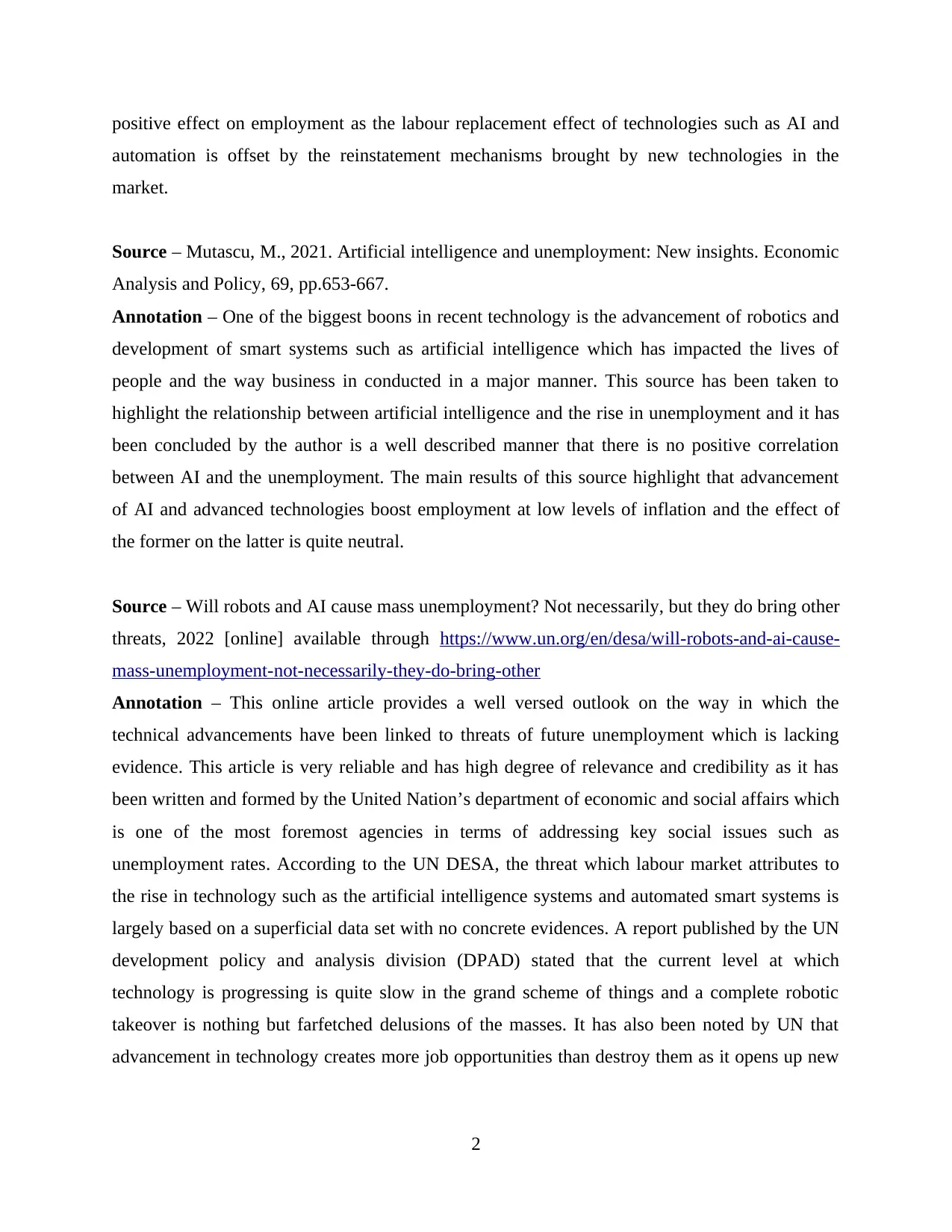
positive effect on employment as the labour replacement effect of technologies such as AI and
automation is offset by the reinstatement mechanisms brought by new technologies in the
market.
Source – Mutascu, M., 2021. Artificial intelligence and unemployment: New insights. Economic
Analysis and Policy, 69, pp.653-667.
Annotation – One of the biggest boons in recent technology is the advancement of robotics and
development of smart systems such as artificial intelligence which has impacted the lives of
people and the way business in conducted in a major manner. This source has been taken to
highlight the relationship between artificial intelligence and the rise in unemployment and it has
been concluded by the author is a well described manner that there is no positive correlation
between AI and the unemployment. The main results of this source highlight that advancement
of AI and advanced technologies boost employment at low levels of inflation and the effect of
the former on the latter is quite neutral.
Source – Will robots and AI cause mass unemployment? Not necessarily, but they do bring other
threats, 2022 [online] available through https://www.un.org/en/desa/will-robots-and-ai-cause-
mass-unemployment-not-necessarily-they-do-bring-other
Annotation – This online article provides a well versed outlook on the way in which the
technical advancements have been linked to threats of future unemployment which is lacking
evidence. This article is very reliable and has high degree of relevance and credibility as it has
been written and formed by the United Nation’s department of economic and social affairs which
is one of the most foremost agencies in terms of addressing key social issues such as
unemployment rates. According to the UN DESA, the threat which labour market attributes to
the rise in technology such as the artificial intelligence systems and automated smart systems is
largely based on a superficial data set with no concrete evidences. A report published by the UN
development policy and analysis division (DPAD) stated that the current level at which
technology is progressing is quite slow in the grand scheme of things and a complete robotic
takeover is nothing but farfetched delusions of the masses. It has also been noted by UN that
advancement in technology creates more job opportunities than destroy them as it opens up new
2
automation is offset by the reinstatement mechanisms brought by new technologies in the
market.
Source – Mutascu, M., 2021. Artificial intelligence and unemployment: New insights. Economic
Analysis and Policy, 69, pp.653-667.
Annotation – One of the biggest boons in recent technology is the advancement of robotics and
development of smart systems such as artificial intelligence which has impacted the lives of
people and the way business in conducted in a major manner. This source has been taken to
highlight the relationship between artificial intelligence and the rise in unemployment and it has
been concluded by the author is a well described manner that there is no positive correlation
between AI and the unemployment. The main results of this source highlight that advancement
of AI and advanced technologies boost employment at low levels of inflation and the effect of
the former on the latter is quite neutral.
Source – Will robots and AI cause mass unemployment? Not necessarily, but they do bring other
threats, 2022 [online] available through https://www.un.org/en/desa/will-robots-and-ai-cause-
mass-unemployment-not-necessarily-they-do-bring-other
Annotation – This online article provides a well versed outlook on the way in which the
technical advancements have been linked to threats of future unemployment which is lacking
evidence. This article is very reliable and has high degree of relevance and credibility as it has
been written and formed by the United Nation’s department of economic and social affairs which
is one of the most foremost agencies in terms of addressing key social issues such as
unemployment rates. According to the UN DESA, the threat which labour market attributes to
the rise in technology such as the artificial intelligence systems and automated smart systems is
largely based on a superficial data set with no concrete evidences. A report published by the UN
development policy and analysis division (DPAD) stated that the current level at which
technology is progressing is quite slow in the grand scheme of things and a complete robotic
takeover is nothing but farfetched delusions of the masses. It has also been noted by UN that
advancement in technology creates more job opportunities than destroy them as it opens up new
2
Paraphrase This Document
Need a fresh take? Get an instant paraphrase of this document with our AI Paraphraser
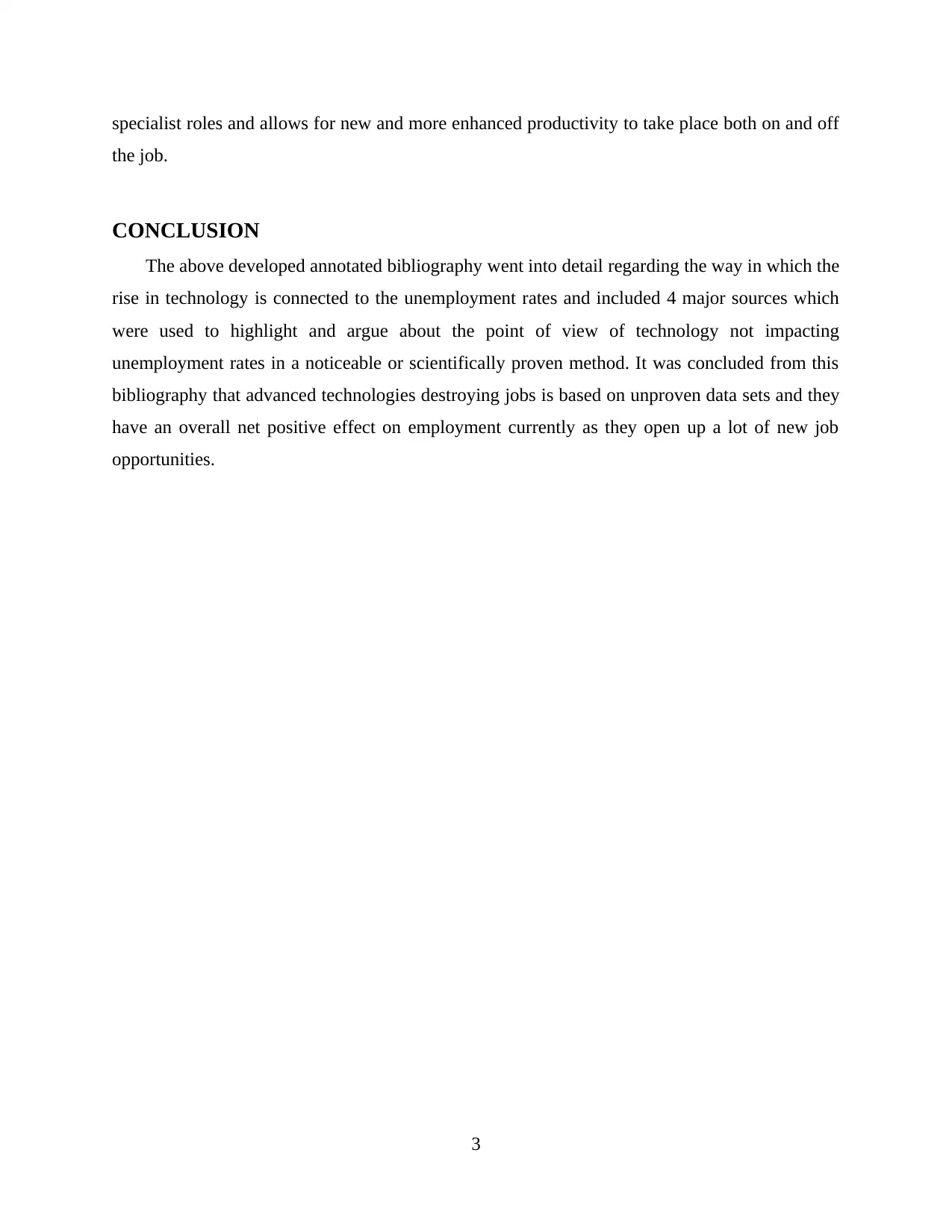
specialist roles and allows for new and more enhanced productivity to take place both on and off
the job.
CONCLUSION
The above developed annotated bibliography went into detail regarding the way in which the
rise in technology is connected to the unemployment rates and included 4 major sources which
were used to highlight and argue about the point of view of technology not impacting
unemployment rates in a noticeable or scientifically proven method. It was concluded from this
bibliography that advanced technologies destroying jobs is based on unproven data sets and they
have an overall net positive effect on employment currently as they open up a lot of new job
opportunities.
3
the job.
CONCLUSION
The above developed annotated bibliography went into detail regarding the way in which the
rise in technology is connected to the unemployment rates and included 4 major sources which
were used to highlight and argue about the point of view of technology not impacting
unemployment rates in a noticeable or scientifically proven method. It was concluded from this
bibliography that advanced technologies destroying jobs is based on unproven data sets and they
have an overall net positive effect on employment currently as they open up a lot of new job
opportunities.
3
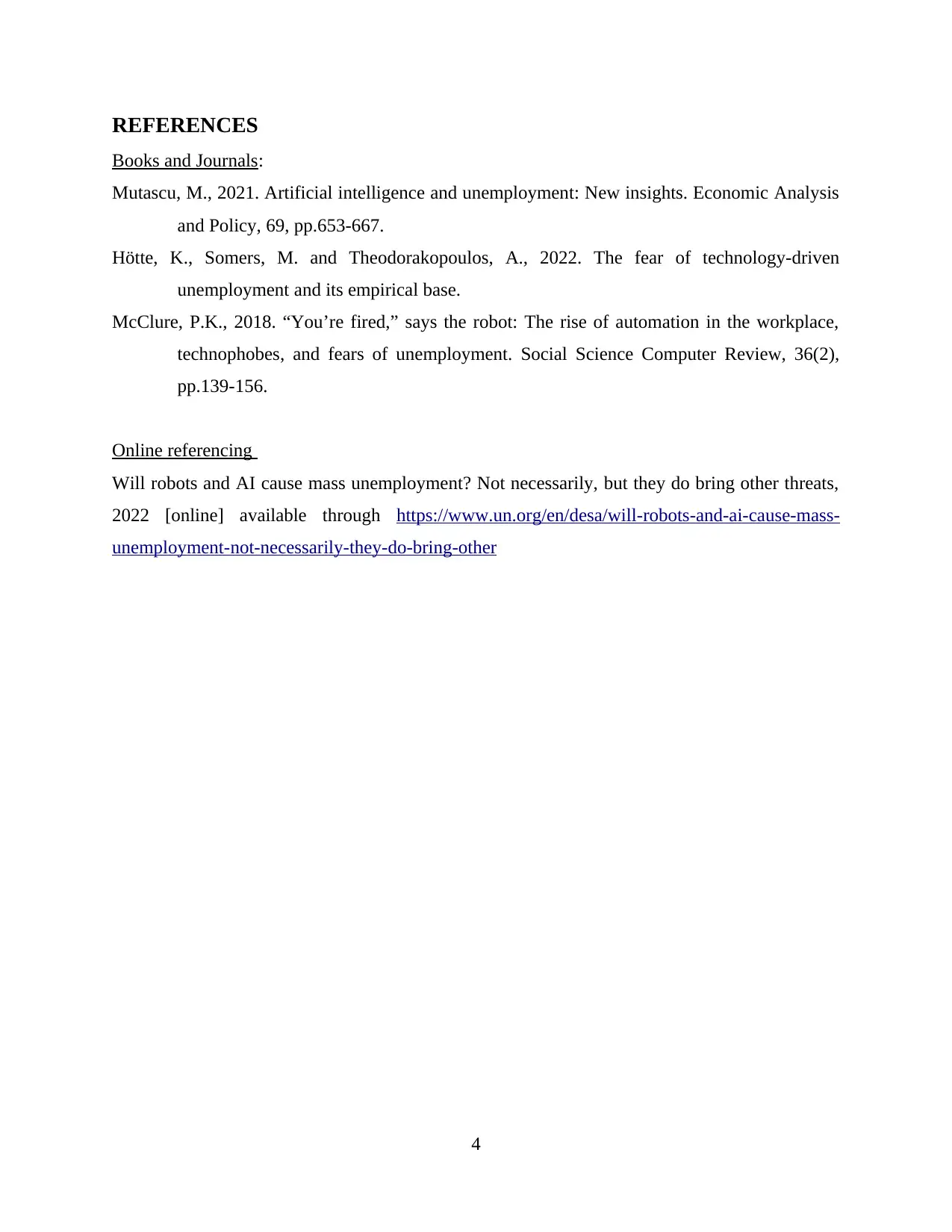
REFERENCES
Books and Journals:
Mutascu, M., 2021. Artificial intelligence and unemployment: New insights. Economic Analysis
and Policy, 69, pp.653-667.
Hötte, K., Somers, M. and Theodorakopoulos, A., 2022. The fear of technology-driven
unemployment and its empirical base.
McClure, P.K., 2018. “You’re fired,” says the robot: The rise of automation in the workplace,
technophobes, and fears of unemployment. Social Science Computer Review, 36(2),
pp.139-156.
Online referencing
Will robots and AI cause mass unemployment? Not necessarily, but they do bring other threats,
2022 [online] available through https://www.un.org/en/desa/will-robots-and-ai-cause-mass-
unemployment-not-necessarily-they-do-bring-other
4
Books and Journals:
Mutascu, M., 2021. Artificial intelligence and unemployment: New insights. Economic Analysis
and Policy, 69, pp.653-667.
Hötte, K., Somers, M. and Theodorakopoulos, A., 2022. The fear of technology-driven
unemployment and its empirical base.
McClure, P.K., 2018. “You’re fired,” says the robot: The rise of automation in the workplace,
technophobes, and fears of unemployment. Social Science Computer Review, 36(2),
pp.139-156.
Online referencing
Will robots and AI cause mass unemployment? Not necessarily, but they do bring other threats,
2022 [online] available through https://www.un.org/en/desa/will-robots-and-ai-cause-mass-
unemployment-not-necessarily-they-do-bring-other
4
⊘ This is a preview!⊘
Do you want full access?
Subscribe today to unlock all pages.

Trusted by 1+ million students worldwide
1 out of 6
Related Documents
Your All-in-One AI-Powered Toolkit for Academic Success.
+13062052269
info@desklib.com
Available 24*7 on WhatsApp / Email
![[object Object]](/_next/static/media/star-bottom.7253800d.svg)
Unlock your academic potential
Copyright © 2020–2026 A2Z Services. All Rights Reserved. Developed and managed by ZUCOL.





